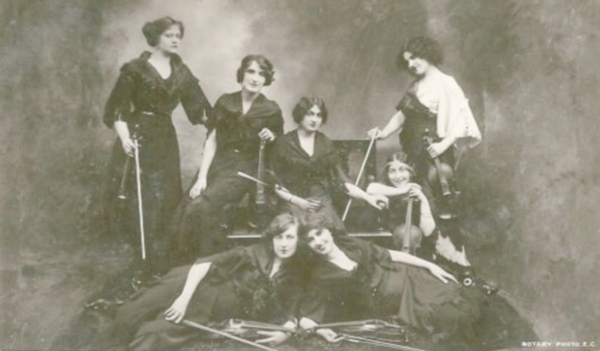I have been enjoying Phil Baker's 'City of the Beast: The London of Aleister Crowley' (Strange Attractor, 2022), which traces his life through places associated with him. In doing so he situates Crowley in a specific London bohemian world of cafes, salons, clubs and temples, populated by people often seen only as (mostly temporary) followers of his but who led interesting lives in their own right - and were probably much more pleasant/less abusive people to befriend.
One of the sites Baker mentions is the Tivoli Theatre which stood at 65-70 the Strand in London, a building 'demolished in 1914, replaced by the Tivoli cinema and the site is now a featureless modern office block'. It was here that in 1913 a musical troupe called The Ragged Ragtime Girls (sometimes spelt Ragged Rag-Time Girls) played for seven weeks, an act consisting of 'seven pretty girls who play the violin and dance at the same time'. I hadn't heard of them previously so set of searching at the British Newspaper Archive and elsewhere to find out more.
A contemporary review describes them as 'a charming septette' sharing a bill with American songwriters Harry Williams and Nat Ayer, composers of 'Oh you beautiful doll' and the dancers
Ida Crispi and Fred Farren. On another occasion they shared a bill at the Tivoli with comedian George Formby sr., father of the later ukelele star (
Sporting Life, 19 March 1913).
The connection with Crowley was that among the seven was Leila Waddell, Australian violinist and sometime 'Scarlet Woman' consort of Crowley. If Crowley is to be believed the group was his idea, arising from his suggestion that 'she should combine fiddling with dancing. My idea was, of course, to find a new art form. But of this she was not capable. She failed to understand my idea'.
He goes on: 'I turned my thoughts to making a popular success for her. We collected six assistant fiddlers, strung together a jumble of jingles and set them to a riot of motion; dressed the septette in coloured rags, called them “The Ragged Ragtime Girls” and took London by storm. It was a sickening business [...] In the early part of 1913, my work had apparently settled down to a regular routine. Everything went very well but nothing startling occurred. On March 3rd, the “Ragged Ragtime Girls” opened at the Old Tivoli. It was an immediate success and relieved my mind of all preoccupations with worldly affairs'. Later that year Crowley was 'free to accompany the “Ragged Ragtime Girls” to Moscow, where they were engaged for the summer, at the Aquarium. They were badly in need of protection. Leila Waddell was the only one with a head on her shoulders. Of the other six, three were dipsomanics, four nymphomaniacs, two hysterically prudish, and all ineradicably convinced that outside England everyone was a robber, ravisher and assassin. They all carried revolvers, which they did not know how to use; though prepared to do so on the first person who spoke to them' (The Confessions of Aleister Crowley).
The group also seem to have played at other London venues including the Tottenham Palace (Stage 10 April 1913) and the East Ham Palace, as well as in Edinburgh, Glasgow and at the Manchester Hippodrome - this time advertised as 'Eight Ragged Rag-Time Girls' (The Era, 17 September 1913).
Then there were a series of shows in the North East of England including the Sunderland Empire with Tiller girl dancers, Miss Louie Tracey, 'a male impersonator' and the Great Barnetti who produced 'weird effects of a black magic character'; and the South Shields Empire Place as 'Seven Gipsy Ragged Ragtime Girls dancing fiddlers'. They also gave their services for free as part of a benefit concert for the Royal National Lifeboat Institution at the Empire Theatre, Newcastle (Newcastle Daily Chronicle, 29 May 1913).


I can find no reference to them playing after November 1913 but more may turn up. Crowley is sometimes described as their manager and producer but whatever his role they also had professional management. In an interview with vaudeville producers Ellis Entertainments Ltd, director Anthony Ellis boasted that 'we were responsible for the appearance of the Ragged Rag-time Girls at the Tivol - an act which proved so popular that it is now, after a seven weeks run at the Tivolo, booked for a year ahead in the provinces, including a return visit to London at Christmas time' (The Era, 22 October 1913).
It should also be remembered that Waddell was an accomplished professional musician - for instance she as described as 'The Queen of Australian Violinists' while playing at West's Picture Palace, Shaftesbury Hall, Bournemouth (Bournemouth Daily Echo, 4 July 1910). Neither was she a passive muse for Crowley's spiritual work, among other things she played a key role in the Rites of Eleusis performed at Westminster's Caxton Hall in 1910, another site mentioned in Baker's book.
 |
| The Ragged Ragtime Girls |
 |
Leila Waddell in the Rites of Eleusis
|







